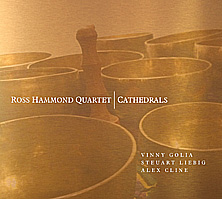 The
best jazz expresses itself in more ways than words ever could. The
best jazz doesn’t even need melodic intent or repetitious chord
structures. The best jazz speaks a language all its own, though it’s
easy to understand. Just ask guitarist Ross Hammond, who after
several solo releases, hits his stride with the 2013 CD release of
Cathedrals by The Ross Hammond Quartet. Ross
has picked some truly exceptional players for Cathedrals, including
Vinny Golia (sax, flute), Alex Cline (drums, percussion)
and Steuart Liebig (bass). A far as a jazz improviser, Hammond
is one of the best of the 21st century. His spontaneous, driving nature,
just levels the playing field. Even though Hammond’s forte is
instrumental jazz improv, there’s also an air of the progressive
here, perhaps due to the contrapuntal accuracy of the players who
seem to feed off each other in a highly combustible mix and match
of sounds. The CD, recorded in Los Angeles in February 2013 is really
well recorded and you can hear each instrument quite clearly thanks
in part to the excellent mixing work of long time Hammond sound man,
Wayne Peet. Upon entering Ross Hammond’s cathedral of
jazz, you’ll be in for a truly inspirational musical experience.
www.RossHammond.com
The
best jazz expresses itself in more ways than words ever could. The
best jazz doesn’t even need melodic intent or repetitious chord
structures. The best jazz speaks a language all its own, though it’s
easy to understand. Just ask guitarist Ross Hammond, who after
several solo releases, hits his stride with the 2013 CD release of
Cathedrals by The Ross Hammond Quartet. Ross
has picked some truly exceptional players for Cathedrals, including
Vinny Golia (sax, flute), Alex Cline (drums, percussion)
and Steuart Liebig (bass). A far as a jazz improviser, Hammond
is one of the best of the 21st century. His spontaneous, driving nature,
just levels the playing field. Even though Hammond’s forte is
instrumental jazz improv, there’s also an air of the progressive
here, perhaps due to the contrapuntal accuracy of the players who
seem to feed off each other in a highly combustible mix and match
of sounds. The CD, recorded in Los Angeles in February 2013 is really
well recorded and you can hear each instrument quite clearly thanks
in part to the excellent mixing work of long time Hammond sound man,
Wayne Peet. Upon entering Ross Hammond’s cathedral of
jazz, you’ll be in for a truly inspirational musical experience.
www.RossHammond.com
mwe3.com presents an interview
with
ROSS HAMMOND
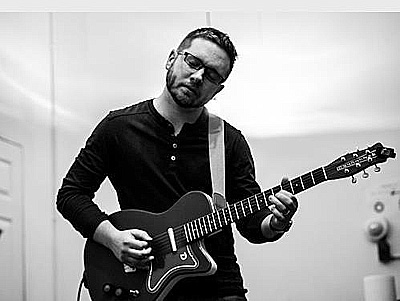 mwe3:
Is Cathedrals somewhat of a return to form for the Ross Hammond
Quartet? Would you say that Cathedrals is an evolution of the
sound that you attained with these same players on your 2011 Adored
CD? What was it like recording again with Vinny Golia, Steuart
Liebig and Alex Cline again? How has the quartet sound changed or
advanced on Cathedrals and what was your recording mission
with these great players this time around?
mwe3:
Is Cathedrals somewhat of a return to form for the Ross Hammond
Quartet? Would you say that Cathedrals is an evolution of the
sound that you attained with these same players on your 2011 Adored
CD? What was it like recording again with Vinny Golia, Steuart
Liebig and Alex Cline again? How has the quartet sound changed or
advanced on Cathedrals and what was your recording mission
with these great players this time around?
ROSS HAMMOND: Yes, this was definitely a follow up to Adored
(2012). I felt like we had made a statement with the first quartet
record and wanted to quickly follow up with another release. I had
written a bunch of new songs with the quartet in mind, and we recorded
everything in an afternoon back in February at Wayne Peet's studio
in Los Angeles. I feel like the band has a specific sound. Like furious
beauty, and after the Adored material live it was easy to put
together another batch of music for the group.
mwe3: What was your guitar setup like for the Cathedrals
CD? How about the sonic effects that you are implementing on the
CD, including pedals, reverb and what amps are you using on the CD?
Was there any acoustic guitar work on Cathedrals? Overall your
guitar CD sound is very clean and clear this time. What’s new
in your guitar universe in 2013?
ROSS HAMMOND: Well, I picked up an old National Debonaire Archtop
back in November, and it's been my main guitar since then. It's a
really interesting guitar. There's no truss rod and it's really light.
It's only about 15 1/2 inches wide at the lower bout, and it's really
comfortable to play. The guitar gets a lot of wonderful overtones
when you play it loud, and the embedded pickup is a single coil. I
had never heard of this guitar before but I saw one sitting in Retro
Fret in Brooklyn when I was back on tour. I played it and knew I wanted
to get one. Unfortunately I had no money at the time, but when I got
the funds together I called them about the guitar. They had sold it,
but I found one online that I bought sight unseen. It's amazing. (lol)
That was the guitar on the whole record. I also played it on singer/songwriter
Amy Reed's record earlier this year.
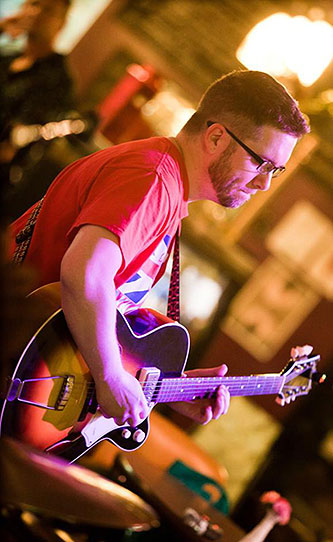 As
for the amps, I'm pretty loyal to the ZT amp still. I've used it for
pretty much every record since my Ambience, Antiquite and Other Love
Songs CD in 2011. Cathedrals was essentially my National arch top
going straight into the ZT Lunchbox. Occasionally I used a Digitech
Hardwire delay for the reverse delay sounds, and if it got crazy I
used the ZVex Distortron. Other than that it was straight into the
amp.
As
for the amps, I'm pretty loyal to the ZT amp still. I've used it for
pretty much every record since my Ambience, Antiquite and Other Love
Songs CD in 2011. Cathedrals was essentially my National arch top
going straight into the ZT Lunchbox. Occasionally I used a Digitech
Hardwire delay for the reverse delay sounds, and if it got crazy I
used the ZVex Distortron. Other than that it was straight into the
amp.
For the acoustic track on the record I used my late 1970’s Yamaha
12 string. It's a great guitar. It has a really nice, aged tone and
it doesn't play too easy. I find that a lot of guitars that play too
easily lack tone and resonance, especially acoustics. This one is
really balanced well. Harrison Phipps, who is a great luthier in Davis,
California reset the neck and made it pristine. But yeah, the old
Yamaha guitars are kind of a secret among some players. They're great
guitars.
mwe3: What was your approach in the studio for Cathedrals?
Were there overdubs or sonic sweetening during and after the recordings?
Were there various takes of certain tracks or was the album done in
one take? What were the rehearsals for Cathedrals like and
how do you feel about recording alternate or remix versions of your
music?
ROSS HAMMOND: The session was really like a live gig. We didn't
do any overdubs or anything like that. We adjust set up and played.
Wayne Peet is a really great engineer and pianist/organist in LA,
and he understands this music. So he was ready for us. I think we
tracked the whole thing in about 6 hours. Wayne mixed it, added a
little compression and reverb and we were done. I really like that
approach. It's great to record knowing that the engineer knows the
music and the sounds you're going for.
mwe3: Why did you call your new album Cathedrals? Perhaps
there’s a more introspective tone to the music this time compared
to say your one of your earlier works Ambience, Antiquite And Other
Love Songs, which was more existential and electronic based. Can
you compare your albums and how has your sound and vision changed
and improved over the past decade?
ROSS HAMMOND: Well, the song Cathedrals is 3 melodies
that are supposed to be played loosely and interchangeably. During
the improvisation, the melodies are supposed to be quoted and developed,
etc. The inspiration for the song is the bells of the cathedral in
our neighborhood. The bells play independently of each other, but
collectively make a very beautiful sound. That was the inspiration
and I thought that would be a good theme for the whole record.
As for the Ambience record, it was approached the same way
in the writing process. But, I wanted to do a solo record that utilized
a lot of electronics and solo "sonic world building." Lately,
I'm not so much into the electronic approach. There are a lot of guitarists
that do that, and I've really just been playing straight into my amp
for the past year or so. I wanted to get back into playing guitar.
Pedals and stuff are cool, but the music isn't in the pedals. The
music is in us, and I feel a little more connected to the music I'm
trying to make when it's just hands and strings. That could, and probably
will change at some point but for now I'm enjoying doing the stripped
down approach.
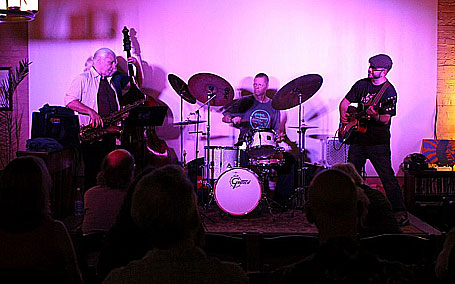 mwe3:
What’s the music scene like for your music in the Sacramento
area and can you compare the vibes you get playing in California to
New York City and other places you’ve traveled? How does the
ambiance of where you play affect what you play? Are you planning
to take your sound to other countries in the future?
mwe3:
What’s the music scene like for your music in the Sacramento
area and can you compare the vibes you get playing in California to
New York City and other places you’ve traveled? How does the
ambiance of where you play affect what you play? Are you planning
to take your sound to other countries in the future?
ROSS HAMMOND: Sacramento is great. We've really built a nice
scene for jazz and creative music here. It's a great location in terms
of the proximity to other music communities, so now we're on the map
as a place for bands to stop while on tour, etc. I like being based
here. I'm quite busy these days. I have 4 or 5 gigs a week, and I'm
still teaching lessons and classes. That along with being a Dad means
I rest easily at night time.
That being said, while one's hometown is great it still means you
have get out and take your music to other places. Touring is still
as important as ever, but an artist shouldn't really plan on touring
to an area unless they're planning on going back there. But, all scenes
are the same. All cities are the same. There is never enough money
for the arts, there are challenges in getting press and challenges
getting crowds, but the music lives on. The DIY approach is really
the one that lasts, so I've always told younger musicians to do it
yourself. Book your tours, put out your own records, etc. If you wait
for someone else to do it you'll be waiting a long time.
I would like to do some international tours but that's a little tricky
right now. My daughter is young and I don't like being away for a
long period of time. I'm happy now doing the 5 days in one place,
3 days in another, etc.
mwe3: How would you compare recording purely improvised music
to music with defined melodies? Coltrane was perhaps the master of
that genre where you could take a song and just completely improvise
off a single melody line or in other cases when ‘Trane would
create a completely unique sonic spectrum, something otherworldly!
How about mixing electronic music into your guitar sound and jazz
fusion sound? How does that fit into your sonic equation?
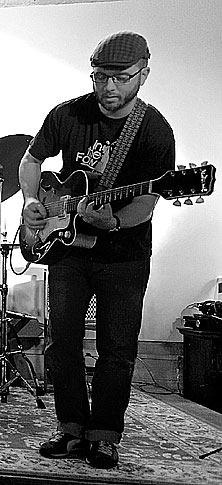 ROSS
HAMMOND: Well, to me improvising is reacting. So if we're purely
improvising with no themes then it's all about listening and responding
to who I'm playing with. It's a lot of push-pull in terms of putting
out ideas and responding to them. It's probably best in that situation
to not think and to just listen. Once you start thinking it spells
trouble.
ROSS
HAMMOND: Well, to me improvising is reacting. So if we're purely
improvising with no themes then it's all about listening and responding
to who I'm playing with. It's a lot of push-pull in terms of putting
out ideas and responding to them. It's probably best in that situation
to not think and to just listen. Once you start thinking it spells
trouble.
If we're improvising over a form or a melody or a chords structure
or something like that the same approach applies, it's just you have
a starting point. In the end I feel like the important thing is for
the band to be together. I think that's true even if you're playing
jazz standards. It's more important for the band to be together and
in a similar musical space than to play the form right, for example.
At least to me….
I've played with quite a few electronic artists (Wes Steed, Ruben
Reveles, Daryl Shawn, etc) and the listening rule still applies. That's
the most import rule in music! Playing with electronic artists is
fun and liberating. A lot of times you're in sonic space that's not
necessarily about rhythm or pitch, but just about sound. So, as an
improviser you have to adapt.
mwe3: In addition to the Ross Hammond Quartet, have you done
any other recent projects this past year? I remember you were talking
about recording a film or documentary soundtrack. I would think your
music, that other side of your music would work quite well for some
film work. Who are your favorite film soundtracks and soundtrack composers?
ROSS HAMMOND: I did a soundtrack to a documentary about the
Sacramento Cemetery's Rose Garden last year. That was a lot of fun.
The music for that is available on my bandcamp site (http://rosshammond.bandcamp.com/album/music-from-cemetery-rose).
I'd love to do some more film work at some point. A lot of that is
just when opportunities arise making the most of them.
Aside from the quartet the project I'm currently working on is a quintet
suite based on 3 of artist Kara Walker's silhouettes. It's a long-form
suite written for 5 instruments with a lot of sections of improvising,
etc. I'll be joined by saxophonists Vinny Golia and Catherine Sikora,
bassist Shawn Hale and drummer Dax Compise. We'll debut that in Sacramento
in October. I'm going to try to do a vinyl release if the recording
comes out good. We'll see...
 mwe3:
What are your upcoming plans as far as writing, recording, performing,
traveling, producing new music in 2013 and 2014? Are there some projects
you’re looking forward and are there artists you’d like
to record with in the future?
mwe3:
What are your upcoming plans as far as writing, recording, performing,
traveling, producing new music in 2013 and 2014? Are there some projects
you’re looking forward and are there artists you’d like
to record with in the future?
ROSS HAMMOND: Aside from the Kara Walker Suite, I'll be traveling
to the East Coast again in the Fall to play a few dates in New York
and Philadelphia. I have some gigs in California with Amy Reed, Jocelyn
Medina, Oliver Lake, Dwight Trible and a few others. Vinny Golia and
I were talking about trying to record some acoustic duets later this
summer. Also I have a new trio with drummer Vanessa Cruz (Revival
Trio) and Kerry Kashiwagi. I just want to stay busy while being a
good Dad and husband. That's all I want, really.
Thanks to Ross Hammond @ www.RossHammond.com
{picture credits top to bottom, Pic 1 - Downtown
Music Gallery, Pic 2 - Zoart photography, Pic 3 - Louise Mitchell
and Pic 4 - George Thompson}



